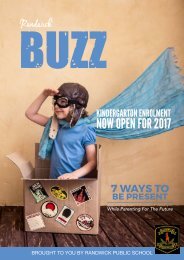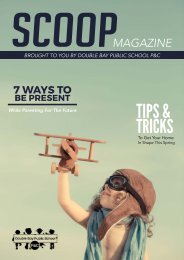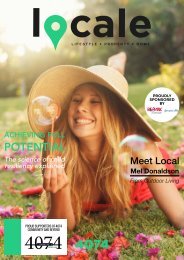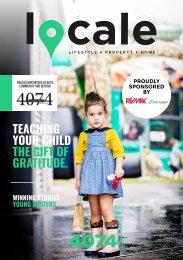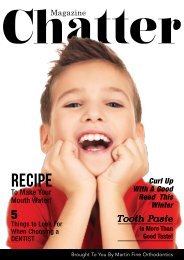BUZZ JUNE 2015
You also want an ePaper? Increase the reach of your titles
YUMPU automatically turns print PDFs into web optimized ePapers that Google loves.
Randwick<br />
<strong>BUZZ</strong><br />
TIPS ON<br />
KEEPING<br />
WINTER<br />
BUGS<br />
AT BAY<br />
How To Raise<br />
Kids That Are<br />
NOT Spoilt<br />
Ways To Stay<br />
Connected 8With Your Kids<br />
TEACHING<br />
KIDS TO SAVE<br />
BROUGHT TO YOU BY RANDWICK PUBLIC SCHOOL • <strong>JUNE</strong> <strong>2015</strong>
putting your neighbours to work
From The Editor<br />
Welcome back to yet<br />
another issue of Buzz<br />
our last for Term 2<br />
Contents<br />
••<br />
Presidents report keeps<br />
us up to date with what’s<br />
going on around the school.<br />
••<br />
8 ways to stay connected<br />
with your kids.<br />
••<br />
A delicious, healthy and<br />
nutrient packed Minestrone<br />
Soup recipe that will keep<br />
the family warm this winter.<br />
••<br />
How to raise kids that are<br />
not spoilt.<br />
••<br />
Dr Joanna McMillan gives us<br />
tips on how to keep winter<br />
bugs at bay.<br />
••<br />
Strategies that will help<br />
teach your kids how to<br />
save.<br />
••<br />
Why goal setting is<br />
important for kids – and<br />
ways we can help them<br />
achieve them.<br />
••<br />
The fun and popular<br />
Michael Palmer from Year 1<br />
hits the Swell Hot Seat.<br />
••<br />
We meet Adam Stott from<br />
the innovative and fresh<br />
living herb company,<br />
Poppin Pods – this month’s<br />
Supporter in the Spotlight.<br />
It is hard to believe that it is already<br />
the middle of the year and we have<br />
reached the half way mark!<br />
<strong>2015</strong> is literally flying by …<br />
Winter has certainly arrived and<br />
Sydney is experiencing a definite<br />
drop in temperature and with the<br />
chilly weather comes the dreaded<br />
coughs and colds and winter bugs.<br />
In this issue, Dr Joanna McMillan<br />
gives us some very helpful advice on<br />
how to boost our kid’s immunity this<br />
winter and keep the lurgies at bay!<br />
We also cover a variety of other<br />
topics from how to teach your kids<br />
to save, to ways to stay connected<br />
with our children and so much<br />
more.<br />
I hope that you enjoy this issue of<br />
Buzz as much as I have enjoyed<br />
compiling it and I wish you and your<br />
family a wonderful winters break.<br />
See you next term!<br />
GEORGINA SENES<br />
ABOUT OUR EDITOR<br />
Georgina Senes has had more than 15<br />
years as a journalist writing for some of<br />
Australia’s leading parenting and family<br />
Magazines including: Australian Parents<br />
Magazine, Pregnancy Magazine, Family<br />
Living Magazine. As well as that she has held<br />
editorial roles at one of Australia’s largest<br />
niche lifestyle publishers. As a mother of<br />
three girls she lives and breathes parenting…<br />
Created, Designed & Delivered By...<br />
themillenniaproject.com<br />
For All Advertising Enquiries Call 1300 900 171<br />
3
HOW TO<br />
Choose Educational<br />
Apps,Games and Websites<br />
Brought To You By Common Sense Media<br />
Despite the claims of certain products that they teach your baby to read or<br />
do math, media that’s really good for learning may not produce immediate,<br />
observable results. Instead, websites and apps with the most learning potential<br />
help your child learn how to learn -- and makes her want to come back for more.<br />
It’s a bit tough to find the good stuff, but<br />
it’s worth it. Many of the apps, games, and<br />
websites that Common Sense reviews also are<br />
rated for learning potential, so check our lists<br />
(https://www.commonsensemedia.org/bestfor-learning-lists)<br />
and reviews (https://www.<br />
commonsensemedia.org/learning-ratings/<br />
reviews) for hand-curated good stuff.<br />
Products that lay the foundation for lifelong<br />
learning encourage questions, foster curiosity,<br />
and support critical thinking. They teach<br />
by engaging kids, building concepts and<br />
deep understanding, providing feedback<br />
about performance (and adjusting difficulty<br />
accordingly), and providing opportunities to<br />
strengthen learning beyond the play session.<br />
A few that incorporate these qualities include<br />
open-ended sandbox games such as Minecraft<br />
andAlgodoo, creative games such as Faces<br />
iMake and Curious World, and math apps such<br />
as DragonBox and Get the Math.<br />
4
Use these pointers for finding apps and websites that are<br />
really good for learning:<br />
Choose age and developmentally appropriate products<br />
Consider what you’d like your kid to learn. Are you interested in boosting<br />
certain academic subjects such as math and reading, or are you looking for<br />
skill builders for creativity, logical thinking, or social-emotional learning? Or<br />
a combination of these? Common Sense’s learning ratings evaluate each<br />
product’s potential for facilitating your child’s learning in these broad areas.<br />
Let your kid’s interests be your guide<br />
No sense insisting your kid play a dinosaur game such as Ansel and Clair:<br />
Triassic Dinosaurs when she really prefers the cute pups in Pet Bingo.<br />
Investigate independently.<br />
Dig deeper than the developer’s description in the app store. Read<br />
unbiased reviews (such as ours), and download a demo if possible or<br />
play on the site.<br />
https://www.commonsensemedia.org<br />
5
FIGHTING<br />
WINTER<br />
BUGS<br />
Winter is upon us and with it comes a whole host of cough, cold and flu bugs for<br />
families to contend with. So is there anything we can do to help our kids catch<br />
fewer coughs and colds this winter, and not get so sick when they do?<br />
I can’t talk about nutritional links<br />
without first reminding us all of how<br />
these bugs are transmitted. Despite<br />
the name “the cold” kids (nor adults)<br />
catch the cold by getting cold. The<br />
cause is a virus (and there are many)<br />
and spread through infected others<br />
coughing and spluttering near us.<br />
Most viruses cannot live for long,<br />
if at all, on inanimate surfaces, so<br />
spraying every surface in the house<br />
with chemicals is not the answer.<br />
Since we cough into our hands,<br />
and kids are likely to be wiping<br />
their noses on their hands, frequent<br />
hand washing with soap is a major<br />
line of defense. I am not a fan of<br />
using antibacterial soaps, sprays and<br />
potions. These have not been shown<br />
to be any more effective than good<br />
old-fashioned soap and water. In<br />
fact they may be more harmful by<br />
eliminating good bacteria around us<br />
and why introduce a whole host of<br />
chemicals to our kids environments?<br />
You can have a clean house without<br />
the use of chemicals that are harmful<br />
to our kids, our environment and us.<br />
But I digress, back to kids immunity.<br />
Good nutrition provides the building<br />
blocks of a strong immune system.<br />
Kids that eat poorly are far more<br />
likely to pick up every bug going<br />
around, and when they do get sick<br />
they will tend to be sicker for longer<br />
than healthier kids. There are of<br />
course other reasons why immunity<br />
can be affected, but there is no doubt<br />
that being well nourished is key. The<br />
nutrients the immune system needs<br />
is extensive and includes vitamin<br />
C, zinc, iron, vitamin A, vitamin E,<br />
calcium, selenium and numerous<br />
phytochemicals (plant chemicals).<br />
What this means is that there is no<br />
one food that can boost immunity,<br />
rather a whole host of different<br />
nutritious foods are required. That<br />
is good news. It means it doesn’t<br />
matter if you can’t get your kid to<br />
eat an orange, if s/he will eat a range<br />
of other plant foods. To get you<br />
started here are my top 10 immunity<br />
boosters for kids:<br />
1<br />
2<br />
3<br />
4<br />
6<br />
Carrots: one of the richest sources of betacarotene,<br />
an antioxidant in its own right but<br />
can also be converted to vitamin A in the body.<br />
Try grating or finely chopping them into stews,<br />
Bolognese or soups, or serve them raw as batons.<br />
Avocado: although not as high in vitamin<br />
E as seeds, that they do contain is far more<br />
available since it is not taken up protecting the<br />
polyunsaturated fats in the food. Vitamin E is<br />
critical to the anti-viral defense mechanisms of<br />
the body.<br />
Onions, leeks and garlic: from<br />
the same family these vegetables contain the<br />
antioxidant quercetin which is antibiotic and<br />
anti-viral. It is not destroyed by cooking – thank<br />
goodness as not many kids I know will crunch on<br />
raw onion in a salad. But try making a leek and<br />
potato soup, or throw onion and garlic into their<br />
pasta sauce.<br />
Cauliflower: often ignored in favour of its<br />
greener cousin broccoli. That’s a shame as most<br />
kids I know happily eat cauliflower. Cauliflower<br />
contains a group of phytochemicals called<br />
glucosinolates, as well as B group vitamins and<br />
fibre, all-important for immune function.<br />
5<br />
6<br />
Dark leafy greens: including spinach,<br />
watercress and cabbage. OK so you’re thinking<br />
there is no chance your child will eat any of these.<br />
My kids are just the same and will not touch<br />
them if they are served up as salad (although<br />
keep persevering – older kids will generally start<br />
to like salad). But think outside the square and<br />
blitz them up with stock to make “green soup”<br />
(yes they’ll rename it but so long as they eat it so<br />
what” or finely shred it and add to sauces and<br />
stews. Make a paste of wilted greens blended<br />
with ricotta cheese, a little grated nutmeg and roll<br />
up in lasagna sheets to make cannelloni or make<br />
a green sauce for ravioli or gnocchi.<br />
Beans, chickpeas and lentils: 70%<br />
of the immune system is in the gut and so good gut<br />
health is at the core of strong immunity. Legumes<br />
are rich in soluble fibre and resistant starch, both<br />
of which fuel the good<br />
bacteria in the gut and in<br />
turn boosts immune<br />
function. They<br />
also provide<br />
plant protein<br />
and an array<br />
of nutrients.
7<br />
8<br />
Nuts and seeds: these foods are serious<br />
nutritional powerhouses. It’s such a shame that<br />
with the risk of allergy many kids are not eating<br />
them. If your own kids are not allergic then<br />
make the most use of these foods outside of<br />
school. They provide vitamin E, fibre, healthy<br />
fats, magnesium, zinc and healthy fats. I sprinkle<br />
home roasted nuts over my kids porridge, give<br />
them a ramekin mix of nuts, seeds, dried fruit<br />
and dark chocolate pieces for afternoon tea,<br />
spread pure nut butter on toast or in sandwiches,<br />
and drizzle nut oil over their vegies.<br />
Kiwi fruit: berries become so expensive<br />
over winter I stop buying them fresh. Kiwi are<br />
great at this time of year however and in terms<br />
of vitamin C content, they rate only behind<br />
guava! I simply half them and serve them to<br />
my kids with a spoon.<br />
Probiotics: a good body of evidence now<br />
shows that children given a good probiotic<br />
experience fewer respiratory infections and when<br />
they do catch a cold they kick it into touch faster.<br />
You can choose from giving them a probiotic<br />
supplement drink or supplement or a probiotic<br />
yoghurt. What is crucial is that you use a tried<br />
and tested bacterial strain – look for the evidence<br />
behind the product – and give it to them daily.<br />
Turkey leg: most kids love poultry but we<br />
tend to rely on chicken. Give turkey a try and go<br />
for the brown meat. It provides more iron and zinc<br />
than the breast, and provides selenium, B group<br />
vits and other immune-boosting nutrients. It’s<br />
also cost effective with a couple of turkey<br />
legs easily feeding the whole family. Plus<br />
the Fred Flintstone connection will get<br />
the kids tucking in happily!<br />
Finally don’t forget the importance of making sure your kids get enough sleep. Being run down<br />
and tired is the fastest route to depressed immunity. A well-nourished and well-rested body is<br />
the one that can most readily stave off this years winter coughs and colds.<br />
Dr Joanna McMillan<br />
Registered Nutritionist and Accredited Practising Dietitian.<br />
For more information on 'The Dr Joanna Plate' go to www.drjoanna.com.au, your trusted nutrition and healthy lifestyle hub.<br />
9<br />
10
This month your P&C has been focused on a couple of important issues that<br />
are affecting the whole school community.<br />
The first relates to some road safety concerns at the corner of Avoca St and Cowper St. It has<br />
become apparent that the small pedestrian island at this intersection can get overcrowded, and this<br />
may place kids at risk. The school and the P&C have been working to get this arrangement changed,<br />
with the aim to make this a safer place to cross. In the meantime we ask parents and kids to take<br />
extra care, and stay on the footpath if the pedestrian island looks crowded.<br />
In regards to the campaign to gain additional classroom facilities to cope with our ever expanding<br />
school population. You may remember that our local member Bruce Notley-Smith made an election<br />
commitment for Randwick Public School to transition to the Open High School building next door.<br />
Since his re-election, we have met with Mr Notley-Smith to gain a firm timetable for gaining access<br />
to this building, and additional playground area. He has undertaken to provide us with an update in<br />
the near future. He has also offered to take up our request for a safer way to cross Avoca St with the<br />
relevant council and state government authorities.<br />
Lastly we are have also been challenging the Eduction Departments proposal to alter the school<br />
catchment area. Some members of our school community have raised concerns that this change<br />
will exclude some families who are located close to the school, but allow for an expanded catchment<br />
from much further away in Kensington. If you are interested, the revised school catchment has been<br />
placed on the canteen noticeboard.<br />
We will keep you updated on this matters as more information becomes available.<br />
Also can we extend a big thank you to Damian Lucas and the large contingent who turned out for<br />
last Sunday's working bee. The school grounds really received a welcome dose of TLC.
8W<br />
A<br />
Y<br />
S<br />
TO STAY CONNECTED<br />
WITH YOUR KIDS<br />
by Georgina Senes<br />
Every parent cherishes those moments when they feel connected with their kids – those<br />
are the times when it feels like it’s all worthwhile and that your heart could just melt.<br />
Connection is as important for parents as it is<br />
for our children. It is the link that keeps your<br />
relationship strong and healthy and which<br />
allows you to be a trusted guide to your child. Kids<br />
who feel strongly connected to their parents want to<br />
cooperate. They trust their parent’s judgement and<br />
respect their advice. Once parents start focussing on<br />
connecting instead of correcting the whole dynamics<br />
of their relationship with their child changes – for the<br />
better.<br />
Parenting is the toughest job on the planet and there<br />
are days when we all do it brilliantly and others when<br />
1<br />
Quality One-On-One<br />
Time Is a Priority<br />
Whilst family time is essential, most<br />
children also crave and actually need, individual<br />
quality time with their parents without the<br />
diversion of other siblings. Spending some one on<br />
one time with your child allows you to really tune<br />
into how they are feeling and what is going on in<br />
their world. Giving them your undivided attention<br />
makes them feel special and lets them know how<br />
important they are to you.<br />
Share A Meal Together Every Day<br />
can barely cope with the basics of feeding, bathing<br />
and getting them to bed– its part of being human and<br />
it’s a side effective of our insanely busy lives that see<br />
parents trying to juggle too many balls whilst at the<br />
same time trying to keep the whole family happy.<br />
The key to developing a strong bond with your<br />
children is to incorporate connection into your families<br />
every day routine and build daily habits that help you<br />
to feel closely linked to one another.<br />
Here are some simple every day strategies that<br />
you can do to help you connect with your kids:<br />
Practice Gratitude<br />
Help your child to develop the gift of<br />
gratitude and you will find that it will<br />
help them to develop an optimistic attitude and a<br />
greater appreciation for life. Asking your child to<br />
tell you three things each day that they are grateful<br />
for is a great way to start promoting thankfulness<br />
and appreciation. Likewise you should tell your<br />
child the three things that you are grateful for each<br />
and every day and they will hear first hand what it<br />
is in life that makes you happy.<br />
Amongst hectic work and school schedules and the demands of life in general, sharing a meal<br />
together as a family is often a herculean task – but one that is both necessary and worthwhile.<br />
Meals together give a family time to nurture connection between each of its members and to<br />
share stories and events from the day. It is a time to focus on each other, to share, to listen and<br />
most importantly to connect.<br />
10<br />
2<br />
3
4<br />
Listen and Show<br />
Empathy<br />
The key to connection is listening. Sometimes<br />
you might need to bite your tongue and<br />
resist the temptation to offer up advice and<br />
solutions and just listen. It is also useful to be<br />
able to look at the situation from your child’s<br />
perspective – put yourself in their shoes and<br />
try and imagine how it is that they are feeling.<br />
Trying to understand how your child is feeling<br />
will go a long way towards you being able to<br />
see and understand the reasons for certain<br />
behaviours and will also help you to regulate<br />
your responses to them.<br />
6<br />
Take a Technology<br />
Time Out<br />
We are all guilty of over indulging in<br />
technology, constantly checking our mobile<br />
for messages or sneaking in some extra time<br />
on the ipad. Take time out of your families<br />
week to switch off all devices and have a<br />
technology ban. Turn the TV off and get<br />
outside and throw a ball with your kids,<br />
play some games or have a chat. Spending<br />
time together without the distraction of<br />
technology enhances both communication<br />
and connection.<br />
Be Present<br />
Play<br />
Laughter and roughhousing help<br />
keep you connected with your child<br />
by stimulating endorphins and oxytocin in you<br />
both. There is nothing more bonding than<br />
a good laugh and play with your kids – its<br />
physically and emotionally satisfying. Making<br />
playfulness a regular feature in your child’s day<br />
helps them to work through any of the stresses<br />
and anxieties that they may have experienced –<br />
it gives them a much-needed release!<br />
Have a Snuggle<br />
For many parents and children the<br />
sacred snuggle up in bed at the end<br />
of the day is the sweetest time they every have<br />
together. Those quiet, companionable, safe<br />
moments of connection allow you and your child<br />
to really bond and savour the love and warmth<br />
of your relationship. When you lie with your child<br />
in a darken room and relax together you will be<br />
surprised at what communication can take place.<br />
Children tend to use this time to confide in their<br />
parents, let their guard down and open up about<br />
how they are feeling. This is a precious time<br />
between parent and child and should feature<br />
regularly in your nighttime routine. Don’t give it<br />
up as your child gets older – late night is often<br />
the only time teens will open up.<br />
Most of us muddle our way through life being half-present. Rushing from one thing to<br />
the next, so busy trying to tick all the boxes that we forget to savour the moment. Your<br />
child is only a child for a very brief window of time and before you know it they will be all<br />
grown up and you will be left wondering where all the time went? Try to slow things down<br />
and to actively engage with your child when you are with them – right here, right now. Its<br />
unrealistic to be completely and exclusively engaged with your child all of the time – life<br />
simple gets in the way but try and do it a little bit every day and you will soon find yourself<br />
naturally doing it more and more. The results will be those heart warming moments of<br />
connection that makes parenting all worth it.<br />
5<br />
7<br />
8
oom or bust?<br />
there has been some speculation from certain<br />
sections of the media that we are soon about<br />
to see the end of the property boom and<br />
some commentators are suggesting we are<br />
in a property market bubble which is about to<br />
burst. this doomsday message is particularly<br />
strong from overseas commentators who have<br />
experienced the pain of a property market<br />
bubble bursting.<br />
in my opinion, there are a couple of reasons why i<br />
believe the australian property market differs from<br />
the overseas property market, which will see the<br />
local market inevitable experience a plateau or a<br />
downturn with a soft landing.<br />
firstly, from a cultural perspective australians have<br />
grown up with “the great aussie dream” of owning<br />
their own home and are prepared to make<br />
sacrifices and work hard to achieve this goal. the<br />
fact that tenants in this country are usually only<br />
offered 6-12 month leases, can not make ‘homely’<br />
changes to the property they are leasing, in some<br />
cases can not have pets, and the property can<br />
be sold during a tenancy with the disruption of<br />
inspections while a tenant only serves for tenants<br />
to get out of that cycle and own their own home<br />
also. while investors owning property in europe<br />
and other parts of the world are happy to offer<br />
tenants 5-10 year leases and i some cases can<br />
be home for 20 years or more.<br />
this cultural difference always serves as an<br />
underlying buyer demand for home ownership<br />
in australia.<br />
secondly, we saw during the gfc a key difference<br />
between australian banks & some overseas<br />
banks who offer “hand back the keys loans”,<br />
which simply means if the value of the home<br />
drops below the loan amount, borrowers can stop<br />
paying the loan and simply ‘hand back the keys<br />
to banks’. this fuelled a stampede of properties<br />
being put on the market by the banks which<br />
only served to make the situation much worse.<br />
in australia, borrowers do not have that choice<br />
and must choose to either ‘ride the market out’<br />
or default on their loan and have the banks<br />
chase them for the shortfall and then be placed<br />
on a default credit register for 5-7 years. most<br />
borrowers, if possible, choose to ride it out and<br />
not realise their ‘paper loss’. this stops the rush<br />
of banks selling properties and an oversupply of<br />
properties o the market.<br />
my advice to buyers is to think long term when<br />
buying a property, to find a property that suits<br />
their needs and one they can afford. then it<br />
doesn’t really matter what the market is doing – it<br />
will likely change many times over the lifetime of<br />
your loan.<br />
Shane VincentPrincipal<br />
Belle Property Randwick,<br />
Shop 1, 25-31 Perouse Road, Randwick NSW 2031.<br />
Office 02 8988 5688 Mobile 0425 333 400<br />
Fax 02 8988 5699<br />
Web belleproperty.com/randwick<br />
p 02 8988 5688<br />
e randwick.info@belleproperty.com<br />
w www.belleproperty.com/randwick
when choosing your new home…<br />
consider location, style and size!<br />
when choosing your new home, the three key elements to consider are location,<br />
style and size.<br />
these three fundamentals have substantial impact upon your comfort and satisfaction<br />
levels, as well as the market value of your home.<br />
location<br />
location is crucial to the re-sale value of your<br />
home, so make sure you think ahead and<br />
look for areas that will serve you well in the<br />
future.<br />
when deciding on a location, your belle<br />
property agent knows the area extremely<br />
well and are also aware of any proposed<br />
changes that are likely to affect your asset in<br />
the future.<br />
on a personal level, you should consider<br />
things like;<br />
• distance from your place of work<br />
• nearby educational facilities<br />
• availability of recreational facilities<br />
• the local town-planning scheme<br />
• and the development potential of the land.<br />
style and size<br />
when determining the style and size<br />
of your home, the top five questions to<br />
consider before making a decision are;<br />
1. how many bedrooms do we want?<br />
2. do you want an extensive garden or low<br />
maintenance surrounds?<br />
3. what are your expectations for your<br />
main living areas?<br />
4. do you want indoor and outdoor<br />
entertaining areas?<br />
5. does the home have the capacity to<br />
extend?<br />
it’s also a good idea to speak with the<br />
seller’s agent who can inform you of any<br />
issues you should be aware of.
RECIPE<br />
Chunky<br />
Minestrone Soup<br />
Packed<br />
full of vegetables<br />
this tasty and simple to<br />
make minestrone soup<br />
is both nutritious<br />
and delicious. The<br />
addition of pasta<br />
transforms a<br />
simple soup into<br />
a hearty meal.<br />
By Georgina Senes<br />
Ingredients<br />
• 2 teaspoons olive oil<br />
• 1 brown onion, finely diced<br />
• 2 cloves garlic, crushed<br />
• 200g bacon, trimmed and coarsely<br />
chopped<br />
• 2 celery sticks, chopped<br />
• 3 carrots, peeled and chopped<br />
• 6 cups of chicken stock<br />
• 700ml Passata<br />
• 150g green beans, trimmed and cut<br />
into 3cm pieces<br />
• 400g tin Borlotti beans, rinsed and<br />
drained<br />
• 2 zucchini, chopped<br />
• 1 cup small pasta shells, spirals or<br />
macaroni<br />
• Shaved Parmesan to serve<br />
(optional)<br />
Method<br />
1. Heat the oil in a large heavy based saucepan over a medium-low heat. Add the onion and garlic and<br />
cook for a few minutes until the onion softens.<br />
2. Add the bacon, celery and carrot and cook for 5 or so minutes, stirring frequently, until ingredients soften.<br />
Add the Passata and chicken stock and increase the heat to medium. Bring to the boil. Reduce heat to<br />
low and simmer for a further 30 minutes.<br />
3. Add the green beans, Borlotti beans and zucchini and cook for a further 4-5 minutes. Add the pasta<br />
and cook for a further 10 minutes or until the pasta is al dente.<br />
4. Season with salt and pepper.<br />
5. Place the soup into serving bowls and top with shaved Parmesan if desired.<br />
Serve with thick crusty bread.
How To Raise Kids<br />
That Are Not Spoilt<br />
By Georgina Senes<br />
One of a parent’s worse<br />
nightmare is having a child<br />
who comes across as spoilt and<br />
ungrateful.<br />
We all struggle to provide<br />
our children with all of life’s<br />
advantages and to give them<br />
everything that we can – we<br />
want them to have every<br />
opportunity and to be able to<br />
get the most out of life.<br />
That is why for many of us we<br />
find it so disconcerting when<br />
we see our or other children<br />
who have been given every<br />
advantage act like eye rolling,<br />
feet stomping, spoilt brats.<br />
Its an awful feeling when you<br />
see your children behaving<br />
like selfish, entitled creatures,<br />
constantly demanding more<br />
and more and not realising<br />
how lucky they are to have<br />
what they have and realise<br />
how much more they have<br />
compared to so many. Any<br />
mum of dad who has a had a<br />
child cry or throw a tantrum<br />
when you have told them that<br />
you wont buy them another<br />
toy or piece of clothing<br />
knows the feeling.<br />
Most parents will regretfully<br />
admit to feeling that at one<br />
time or another their child<br />
is spoilt and ungrateful. Its<br />
part of the parenting code of<br />
conduct – something we all<br />
experience.<br />
Luckily, there are many<br />
small things that you can<br />
do and strategies that you<br />
can implement that will help<br />
to encourage your child to<br />
appreciate their life and to<br />
grateful for all that they have.<br />
Like most things in the<br />
parenting world it takes time<br />
and consistency so don’t<br />
expect a miracle overnight.<br />
Plug away and enforce the<br />
following techniques and<br />
lifestyle tweaks into your<br />
family’s routine and hopefully<br />
at the end of the day your<br />
child will be thanking you!<br />
Make manners count:<br />
The three most important<br />
words in the English language<br />
are without a doubt “Please”<br />
and “Thank You”. No three<br />
words have more power or<br />
more magic. Be absolutely<br />
vigilant with ensuring that<br />
your children use these three<br />
magical words and that<br />
they use them often. Lead<br />
by example and make sure<br />
that you mind your manners<br />
and speak to people politely.<br />
You are your child’s greatest<br />
teacher and best example – so<br />
set the standard high.<br />
16
Ensure your child knows what to truly be<br />
grateful for:<br />
If you ask your child what makes them happy<br />
and what they are most grateful for most of<br />
the time they will answer you with a material<br />
possession. They are grateful for their ipad or<br />
their scooter and buying the latest video game<br />
makes them happy. Try and encourage your child<br />
to know what is really valuable in life and teach<br />
them that material objects are simply replaceable<br />
possessions. The most important things in life are<br />
not tangible – teach them to be truly respectful<br />
and grateful for things like health, family, friends,<br />
feeling safe, going to sleep at night in a warm<br />
bed with a full tummy. These are the things that<br />
we want them to value the most.<br />
Make sure that they really listen and<br />
that they “get it”:<br />
One of the biggest roadblocks in training your<br />
kids to be thankful is self-absorption. Most kids<br />
are so caught up in what they think, how they<br />
feel and what they want that they often forget<br />
that many people make the world go around and<br />
all the people in it have feelings and desires too<br />
– parents included. Often kids can only identify<br />
and relate to how things impact on their own<br />
lives, their own little universe and often fail to<br />
see the effect that it may have on others. Teach<br />
your children that they are one small part of a<br />
much bigger picture and encourage them to look<br />
at situations from not only their own but also<br />
others perspectives. Emphasise them importance<br />
of listening to others and taking the time to<br />
consider things from another’s point of view.<br />
Often children do not even realise that they are<br />
being self absorbed and selfish they simply get so<br />
caught up in how an event or action has affect<br />
them that they forget to put it in context and look<br />
at the wider scenario.<br />
Teach them the value of a dollar:<br />
Adults are all too aware of how hard they have<br />
to work to make a dollar. Kids on the other hand<br />
think that money grows on trees, that ATM’s<br />
simply print money and that using credit cards<br />
is like getting something for free. From an early<br />
age it is important to teach children the value of<br />
money and the importance of contributing. A<br />
child as young as four is more than capable of<br />
putting their plate in the sink whilst a child of<br />
nine can unstack a dishwasher and a teenager<br />
can competently wash a car. As part of a family all<br />
members need to contribute and learn that there<br />
is no such thing as a free lunch.<br />
Give them a social conscience:<br />
All children need to be taught the importance of<br />
giving back. They need to know how<br />
lucky they are and they need to<br />
know that not everyone is as<br />
fortunate as them. Children<br />
also need to be taught that<br />
their actions can make a<br />
difference and small things<br />
that they do and changes that<br />
they make can have a huge<br />
impact on others. Get your<br />
children to regularly clean<br />
out their clothes and toys<br />
and donate them to<br />
charity, sponsor a<br />
child through World<br />
Vision, volunteer<br />
your time and let<br />
your kids see the<br />
difference that one<br />
person’s actions<br />
can make.
S<br />
UPPORTER IN THE<br />
POTLIGHT<br />
Adam Stott<br />
General Manager at Poppin Pods<br />
Buzz is a big fan of anything fresh and<br />
natural, anything that will get our girls<br />
eating healthy and anything that is<br />
Australian owned and gown. Poppin Pods<br />
ticks all those boxes and more, which is<br />
why we are really excited to introduce this<br />
month’s supporter in the spotlight; Adam<br />
Stott, General Manager at Poppin Pods, a<br />
company that is dedicated to producing<br />
fresh living herbs that you can use in your<br />
kitchen!<br />
Here we chat to Adam about the Poppin Pods<br />
products and about what sets this business ahead<br />
of the rest.<br />
18<br />
<strong>BUZZ</strong> : Hi Adam, thanks for agreeing to be<br />
this month’s Tara Talks Supporter in the<br />
Spotlight. Behind every great company is a<br />
story. Tell us the story behind Poppin Pods?<br />
Adam: Over the last 5 years there has been a huge<br />
push towards fresh. Consumers were demanding<br />
fresher food with real taste. Herbs were near the top<br />
of this list after enjoying increased demand due to<br />
the success of cooking shows and the trend toward<br />
healthy eating.<br />
Retailers were trying everything to achieve fresh,<br />
convenient and longer lasting herbs. Cut herbs die in<br />
the fridge, tubed herbs surfaced, however, they had<br />
huge amounts of preservatives added so the taste<br />
inherently suffered. Lightly dried herbs were tried,<br />
but they missed the point as they were dead as well.<br />
Consumers were asking how long had the herbs been<br />
packaged and what nutritional value had they lost?<br />
Living herbs had to be the answer as they provide<br />
maximum nutritional value and taste however they<br />
were messy, awkward and the pots were too big to<br />
handle in your shopping.<br />
We identified all these issues and came up with the<br />
solution that provides a clean easy and convenient way<br />
for you to enjoy living herbs from the convenience<br />
of your kitchen top. We took all the benefits of cut<br />
and potted herbs, and removed the negatives.<br />
<strong>BUZZ</strong> : Explain to us how Poppin Pods<br />
works? What kind of care and maintenance<br />
is involved?<br />
Adam: Poppin Pods is all about choice. First you<br />
pick your Display Shell that suits your kitchen. Then<br />
you choose the herbs you like, pop them into your<br />
Display Shell. Today we range about 20 different<br />
varieties of herbs and that is still growing.<br />
You will find that because the herbs are there, you<br />
use them more. You try new combinations and add<br />
them to everything from smoothies to salads and<br />
every meal in between. When you have used all of<br />
the herbs you simply replace it on<br />
your next shopping visit.<br />
As far as care and<br />
maintenance goes it’s<br />
really easy; a bit of water<br />
and a bit of sunlight (it<br />
doesn’t even have to be<br />
direct sunlight), that’s it.<br />
All of our herbs are grown<br />
in natural soil, so unlike<br />
hydroponic varieties, our<br />
pods are full of nutrients<br />
that last for weeks.
<strong>BUZZ</strong> : What are some of the advantages<br />
of Poppin Pods herbs?<br />
Adam: They are grown ready to eat. Unlike herbs<br />
that are grown for planting in your garden, our herbs<br />
are grown big and bushy, ready to harvest from the<br />
day you buy them.<br />
There is no mess with Poppin Pods. Unlike normal<br />
potted plants, the pods don’t have drainage holes<br />
so they don’t flood your benchtop when you water<br />
them. They keep small reservoirs of water in the<br />
bottom to keep them alive longer without drowning<br />
the root system of the herb.<br />
Our herbs are grown the natural way! The cost<br />
pressures of the past have steered other growers to<br />
move into temperature controlled growing sheds,<br />
some even use ultraviolet light at night to grow<br />
faster. No thanks! Poppin Pods provides the real taste<br />
that comes from being grown the natural way in<br />
natural soil.<br />
<strong>BUZZ</strong> : Tell us a bit about the range of<br />
products that Poppin Pods has?<br />
Adam: You start with the Display Shell. We have<br />
everything from plastic, tin, revived wood, timber<br />
cradles and to the top of the range Bamboo. You<br />
really have to see the bamboo! So firstly pick your<br />
shell.<br />
Then you choose your herbs. We have around 20<br />
varieties at the moment from the common ones such<br />
as mint, rosemary, basil, coriander, parsley, thyme,<br />
chives etc to some others like Vietnamese mint,<br />
sorrel, chervil and soon to be released edible flowers.<br />
<strong>BUZZ</strong> : Why do you think that is so<br />
important to eat fresh?<br />
Adam: There are a number of reasons but the top<br />
two are taste and nutritional value.<br />
I think a lot of people have grown up having a<br />
tomato plant or strawberries grown at home in the<br />
past. What is the thing you remember the most?<br />
TASTE! The difference in taste is so significant which<br />
is why all the retailers are claiming to be the freshest.<br />
From a nutritional value point of view we are all still<br />
learning. We are finding out new things all the time.<br />
I applaud the Mushroom Growers Association who<br />
joined together and commissioned a food scientist<br />
to research the nutritional value of mushrooms at<br />
different stages. What they learnt was fantastic.<br />
If you leave your mushrooms in the sun the day<br />
before eating, they will have the equivalent vitamin<br />
D nutritional value as they did when fully grown.<br />
That’s not the same if you eat them straight out of<br />
the fridge.<br />
<strong>BUZZ</strong> : What are some of your favourite<br />
dishes that you use Poppin Pods herbs in?<br />
Adam: It’s really funny, because these days I don’t<br />
have anything cooked at home without herbs.<br />
My salad sandwich wouldn’t be the same without<br />
basil or coriander. My fish can’t be cooked without<br />
thyme. The kids mash always has chives. Mums and<br />
dads have some of the best recipes because they<br />
constantly trying new things.<br />
Stay tuned to our website as we always have recipes<br />
from our brand ambassador Luke Mangan up there<br />
and there will be a lot more coming soon.<br />
<strong>BUZZ</strong> : What makes the Poppin Pods range<br />
so special? What sets it apart from other<br />
companies producing similar products?<br />
Adam: We listened to what the consumer wanted.<br />
They were sick of herbs dying in the fridge so they<br />
only bought them when they knew they were going<br />
to use them in a specific meal. Consumers wanted<br />
real taste and nutrition, which they weren’t getting<br />
in a clean easy and convenient way. They now can.<br />
<strong>BUZZ</strong> : How do we find out about Poppin<br />
Pods or purchase some of their great<br />
products?<br />
Adam: www.poppinpods.com.au is best, or you<br />
can find us on Facebook. Register on our website<br />
and you will be kept up to date. There are some very<br />
big things around the corner. Does anyone buy cut<br />
flowers? That’s all I’m saying right now.<br />
www.poppinpods.com.au<br />
<strong>BUZZ</strong> : Thank you so much Adam. It has been really great to talk to you and<br />
to find out about the Poppin Pods range and some of the advantages of living<br />
fresh herbs. Buzz feels certain that lots of Buzz’s mums and dads will be keen to<br />
explore the Poppin Pods product range – you might even have inspired some<br />
creative cooking!<br />
19
component<br />
1<br />
Helping children connect<br />
across cultures<br />
“Would you like to come to my party?” Ella asked Sefra. “It’s on Sunday in two weeks.”<br />
“Thanks Ella, I’ll ask my parents if I can come,” said Sefra.<br />
Sefra wanted to go to Ella’s party, but it was at the same time as her weekly language<br />
class. Sefra’s parents always told her how important it was to keep up her culture and<br />
language. Would they let her miss the language class and go to Ella’s party instead?<br />
Sefra hoped they would.<br />
Though she was excited about the party, Sefra also felt nervous. Not everyone who might<br />
be going was as good a friend as Ella. Some children in Sefra’s class teased her because<br />
she didn’t look or speak like they did. They stopped when Ella told them not to be mean,<br />
but it still hurt.<br />
Sefra hoped the other children at the party would be friendly and play with her.<br />
20<br />
Being part of two cultures<br />
Being part of two cultures can get complicated at times.<br />
Children may nd there are differences in values and<br />
expectations. Sometimes there might be dif cult choices.<br />
When different sets of expectations don’t match, it can<br />
make it hard for children to feel like they belong.<br />
When cultural differences are respected and a sense of<br />
belonging develops, there are many bene ts to mental<br />
health and wellbeing for children, families and schools.<br />
By working together, schools and families can help<br />
children from all cultural backgrounds to understand,<br />
respect and appreciate diversity in others. Helping<br />
children to understand difference encourages them to<br />
feel good about themselves, understand where they t<br />
in the world, and appreciate diversity in others. When<br />
adults behave in ways that are open and accepting<br />
it can help to teach children to respect diversity and<br />
embrace individual differences.<br />
Everybody needs to feel accepted, respected and<br />
included. Feeling welcome and at home in both cultures<br />
is very important for positive mental health<br />
and wellbeing.<br />
Australia is home to people from many different cultural<br />
backgrounds. Creating a positive sense of community<br />
for everyone involves learning to understand and<br />
appreciate others’ values, experiences and beliefs<br />
so that together we can build a caring and accepting<br />
society that supports mental health and wellbeing.<br />
Parenting is rarely easy<br />
Being a parent in a new country has added challenges.<br />
Just as it can be dif cult for children to learn to be part<br />
of two cultures, learning to parent ‘between’ cultures can<br />
be stressful for families too. Being open to adapt your<br />
parenting to suit your child’s individual needs, and your<br />
own, can be bene cial for all families.
How parents and carers<br />
can help<br />
• Tell your children stories to help them to develop<br />
a strong cultural identity and share a sense of pride<br />
in your culture.<br />
• Talk to children about the Australian cultural values<br />
you appreciate. This will help them see how they<br />
can be part of both cultures.<br />
• Seek support and advice from people you trust.<br />
Talking with relatives and friends who understand<br />
your values can help you think through the different<br />
problems you might face as a parent.<br />
• You can contact your child’s school if you have<br />
any questions about your child or their education.<br />
Schools welcome questions from parents and carers.<br />
• Take an active interest in activities at your child’s<br />
school. Get to know your child’s teacher and look<br />
for ways to get involved at school, for example,<br />
by helping in the classroom or by joining parent<br />
working groups.<br />
• If children complain of being teased or bullied,<br />
be sure to tell your child’s teacher so the school<br />
can take action to stop it.<br />
Things schools can do<br />
• Provide opportunities for students to express<br />
and listen to different people and their cultural<br />
perspectives to develop respect for and appreciation<br />
of diversity.<br />
• Talk to parents, carers and families about their<br />
cultural values and needs.<br />
• Respect individual differences – don’t assume that<br />
membership of a cultural group means everyone has<br />
the same values and needs.<br />
• Invite family members into the classroom to observe<br />
and participate.<br />
• Promote and model inclusive behaviour, for instance,<br />
by providing information and school correspondence<br />
in a number of appropriate languages for parents<br />
and carers.<br />
• Work with interpreters or multilingual aids to ensure<br />
accurate communication with parents or carers<br />
whose English language skills are limited.<br />
• Encourage social opportunities for parents, carers<br />
and families to support and learn from each other.<br />
• Link families with local services to provide<br />
culturally-appropriate support and assistance.<br />
The following websites may be of interest<br />
About diversity:<br />
www.cyh.com<br />
Translated materials on parenting:<br />
www.kidscount.com.au<br />
Raising children in a different culture: www.raisingchildren.net.au<br />
This resource is part of a range of KidsMatter Primary information sheets for families and school staff.<br />
View them all online at www.kidsmatter.edu.au<br />
Copyright: © Commonwealth of Australia 2012-13. This work is copyright. You may use this work in accordance with the terms of licence available at www.kidsmatter.edu.au<br />
21
CHECK YOUR SMILE TODAY!<br />
Early detection will save you time and money!<br />
NO<br />
REFERRAL<br />
NEEDED!<br />
Early detection of teeth and jaw problems could save you a lot of time and money!<br />
From as young as 7 years of age, children should have their mouths checked for<br />
overcrowding, overbites and under bites. This will allow us to lay out a longer term<br />
plan for your child.<br />
At Martin Fine Orthodontics we have a ‘No Frown Zone’ policy, your children will<br />
enjoy the experience and we will ensure Mum and Dad will have no cause to frown.<br />
Call now for an appointment 9369 3566<br />
www.fine.com.au<br />
BOOK EARLY FOR SCHOOL HOLIDAY APPOINTMENTS<br />
Level 8, 35 Spring Street,<br />
Bondi Junction, NSW 2022.<br />
02 9369 3566<br />
Level 1, 633 Anzac Parade,<br />
Maroubra, NSW 2035<br />
02 9369 3566
HOT SEAT<br />
This month Buzz sits down with the much loved,<br />
Mr Michael Palmer from Year 1<br />
MR MICHAEL PALMER<br />
<strong>BUZZ</strong>: Tell us a little bit about your<br />
childhood. Where did you grow up<br />
and what is your favourite childhood<br />
memory?<br />
Mr Palmer: I grew up just down the road in<br />
Bondi and I’m lucky to say I’m still living in that<br />
area now. I am very much a water baby so some<br />
of my favourite childhood memories include<br />
heading down to the beach with my friends after<br />
school in Summer to swim and play sport on the<br />
beach.<br />
<strong>BUZZ</strong>: Where did you go to school and<br />
did you enjoy your time there?<br />
Mr Palmer: I really enjoyed school and I went to<br />
Bellevue Hill. It’s weird when we verse them in<br />
PSSA because I want Bellevue Hill to do well but<br />
at the same time I want Randwick to win.<br />
<strong>BUZZ</strong>: What was your favourite<br />
subject? You are on the technology<br />
committee – have you always<br />
been interested in information and<br />
technology?<br />
Mr Palmer: I was very good at Maths and sport.<br />
If I could have played sport all day long I would<br />
have. I have only recently joined the technology<br />
team so I am still learning a lot from the other<br />
teachers. I think it’s cool that we get to use iPads<br />
in class because when I was in school we only<br />
had one computer in each classroom so you were<br />
lucky if you got a turn.<br />
<strong>BUZZ</strong>: What do you love the most about<br />
being a teacher?<br />
Mr Palmer: I love when a student accomplishes<br />
something they may have originally thought they<br />
couldn’t do. Watching them succeed and seeing<br />
how excited they get makes me really love my<br />
job. I also like watching the students grow over<br />
the years. My first year 1 class is now in year 5 so<br />
it’s fun watching their personalities develop over<br />
the years as they become older.<br />
<strong>BUZZ</strong>: What is the hardest thing about<br />
being a teacher?<br />
Mr Palmer: I wouldn’t say it’s the hardest but<br />
there is a lot of marking involved with being a<br />
teacher.<br />
<strong>BUZZ</strong>: You take PSSA cricket – do you<br />
love all sport? What’s your favourite<br />
sport and who do you barrack for?<br />
Mr Palmer: I love all sports and have enjoyed<br />
coaching the cricket teams the past few years. I<br />
made a few grand finals when I played PSSA but<br />
I never won one, so to watch the cricket teams<br />
work and train so hard all season and win the<br />
final is a great feeling. I still play rugby on the<br />
weekends but my favourite sport to watch is NRL<br />
and I support the Broncos while all my family and<br />
friends cheer on the Roosters.<br />
<strong>BUZZ</strong>: If you can pass on just one piece<br />
advise to the kids at Randwick Public<br />
School what would it be?<br />
Mr Palmer: Do your best and just enjoy yourself.<br />
I always tell my class that it’s ok to make mistakes<br />
as long as you learn from them.<br />
<strong>BUZZ</strong>: Thanks so much for the chat<br />
Mr Palmer. It has been great getting to<br />
know you a bit better!<br />
HS<br />
23
24<br />
SCHOOL
®<br />
MAROUBRA<br />
Call 0412 513 414<br />
www.beginbright.com.au<br />
Helping to create<br />
happy, smart<br />
and confident<br />
children.<br />
School<br />
Readiness<br />
& Primary<br />
Tutoring
Get<br />
Your Skin<br />
Winter Ready<br />
This winter we want to help you keep that dry flaky skin at bay. Lactic<br />
Acid is considered the most hydrating of all peels.<br />
SPECIAL WINTER<br />
PROMOTION<br />
Get 6 Lactic Peels valued at $534<br />
LIMITED TIME ONLY!<br />
now<br />
ONLY<br />
$267<br />
save<br />
50%<br />
Ph. 9399 3309 | 22 Perouse Rd Randwick | www.therevamprooms.com
You can’t stop the music at Randwick Public School.<br />
This year the school’s two bands - the Performance<br />
and Training Bands – are bigger than ever. There are<br />
over 100 students playing 10 different instruments.<br />
Next year, there’ll be a third band, with Year 3<br />
students invited to join Music the jam. That’s a lot of noise!<br />
But it’s all music to the ears of Megan Lipworth, our<br />
passionate and dedicated musical<br />
director. Megan has been in and<br />
around school bands nearly all<br />
her life. She loves the challenge<br />
of transforming these budding<br />
musicians into professional players.<br />
Megan and the Performance Band<br />
at the Leadership Ceremony<br />
So watch the bands rock at school<br />
assembles and presentation days.<br />
See them swing at local fetes and<br />
fairs.<br />
From the Bandmates Special Morning Tea:<br />
spot the conductor!<br />
27
Teach<br />
By Georgina Senes<br />
how and why it’s important<br />
YOUR KIDS<br />
TO SET<br />
GOALS:<br />
Having goals is a terrific way to give you direction, motivation and focus. It helps<br />
you to see clearly what you want to achieve, gives you the opportunity to work out<br />
what you need to do to achieve it and helps you to make things happen.<br />
Same goes for our kids.<br />
Setting goals and knowing what skills you need to achieve them is an important<br />
life skill – one that we need to teach out kids and the earlier the better.<br />
Goal setting can really help children when<br />
• They feel overwhelmed by how much they have going on.<br />
• If they are lacking direction and focus.<br />
• When they have a big project or something difficult or challenging that they need to get done.<br />
How you can help your<br />
child to set goals<br />
When your child has the idea of what they want<br />
to do then there are three simple steps that you<br />
need to help them take to set their goal:<br />
• Make the goals their own: Let your child work<br />
out and decide what they want their goal to<br />
be. Don’t force your ideas onto them. They<br />
are much more likely to succeed in achieving<br />
their goals if they are passionate about them<br />
and if they come from their heart. You can<br />
always prompt them and help motivate and<br />
guide them in a particular direction but at the<br />
end of the day let them decide for themselves<br />
what it is that they want to achieve.<br />
• Make the goals realistic: Start small, keep it<br />
simple and make sure that your child’s goals<br />
are age appropriate.<br />
• Act as a mentor: When your child sets goals and<br />
works towards achieving them they need you<br />
to be their cheer squad, support crew and<br />
mentor. Show enthusiasm for your child’s<br />
achievements and celebrate progress along<br />
the way. Encourage them to keep going<br />
when they face obstacles and keep them<br />
motivated when they start to waiver.<br />
30
5<br />
Simple steps that<br />
will help kids<br />
achieve their goals<br />
1. Set the goal: Get your child to choose a goal<br />
and then write it down. Stick the goal<br />
somewhere prominent where your child will<br />
see it often.<br />
2. Work out your timeframe: Figure out how long<br />
you and your child think it will take for them<br />
to achieve their goal and set a date that you<br />
want it accomplished by.<br />
3. Work out sub goals: Help your child to work out<br />
the steps that they need to take to achieve<br />
their goal and write down everything that<br />
needs to be done. From here you can work<br />
out sub goals that will act as stepping-stones<br />
to achieving the final goal.<br />
4. Plan: No goal will be achieved without a plan<br />
of attack - so don’t let your child try and<br />
wing it! Encourage your child to work out<br />
exactly how they are going to make their<br />
goal a reality and plan how they are going to<br />
make it happen.<br />
5. Celebrate achievements: When your child<br />
achieves their goal no matter how big or<br />
small make a big fuss and celebrate their<br />
achievements!<br />
Key points to remember<br />
when teaching kids<br />
about goal setting<br />
Be realistic: Start small and you can go bigger<br />
when you get better at setting and reaching<br />
your goals.<br />
Keep positive: Don’t let people or hiccups along<br />
the way deter you.<br />
Keep on track: Every day reconfirm your goal.<br />
Believe: Know that you CAN do it!<br />
Confide in someone: Talk to someone you trust<br />
about the goal that you have set and what you<br />
want to achieve. Support can be really helpful.<br />
Keep going: At times you might feel like you are<br />
not making much progress but don’t stop – keep<br />
moving forward. Small steps are better than no<br />
steps!<br />
Don’t stress: Relax and enjoy the process!
Teaching<br />
KIDS TO<br />
$AVE MONEY<br />
Teaching kids how to save money is not<br />
easy. Most kids have an “easy come,<br />
easy go” approach to money. They like<br />
to spend it as soon as they get it – you<br />
can virtually see their pocket money<br />
burning a hole in their pockets!<br />
1. Lead by example:<br />
Keep a money box at home somewhere<br />
visible where the whole family can see<br />
it. Get into the habit of regularly using it<br />
and putting coins and small notes into it.<br />
Also talk to your kids about things that<br />
you are planning and budgeting for.<br />
2. Give rewards:<br />
Giving your child a financial reward for<br />
jobs they do around the house is a good<br />
way to teach them the value of earning<br />
their own money. Likewise, giving your<br />
children a weekly or monthly pocket<br />
money is also a handy way to teach<br />
them how to budget and save.<br />
3. Set goals:<br />
Most kids have plenty of things that they<br />
are desperate to purchase or for you to<br />
purchase for them! Encourage your child<br />
to identify what particular thing they<br />
wish to save for, to prioritise, and help<br />
them work towards achieving it.<br />
By Georgina Senes<br />
Regardless of age, the best way to<br />
teach any children about the value and<br />
importance of saving is to start small and<br />
to keep it simple.<br />
Here are some tips that you can follow<br />
that will help encourage your children to<br />
start saving:<br />
5. Let your child make mistakes:<br />
Some times the best lessons come from<br />
a poor decision, especially when your<br />
child is young and the financial loss will<br />
be relatively insignificant. If your child<br />
gets money for their birthday and rushes<br />
out and spends it immediately only to<br />
realise that they have<br />
no money left<br />
for the new<br />
game that<br />
they really<br />
want they<br />
may make<br />
different<br />
choices the<br />
next time.<br />
4. Match them:<br />
A great way to motivate your child to<br />
save is to match them dollar for dollar. If<br />
your child is aiming to save $100 to take<br />
on your end of year family holiday then<br />
offer to match the same amount once<br />
they have reached their goal. Similarly,<br />
if your child is saving for a new game<br />
offer to meet them halfway. This concept<br />
works well and helps to keep kids<br />
motivated to save.
Your circle of trust<br />
Because there’s<br />
a lot riding on<br />
your Tyres<br />
1300 651 413<br />
www.kumho.com.au<br />
communications@kumho.com.au<br />
www.facebook.com/kumhotyres<br />
@kumhotyres<br />
ADD KUMHO TYRES TO YOUR CIRCLE OF TRUST
.com.au<br />
GROCERIES IN 2 HOURS<br />
ALDI, COLES & HARRIS FARM<br />
RECIPE: Porcupine Meatballs<br />
Easy 4 servings 50 mins<br />
INGREDIENTS<br />
500g minced beef, 1/4 cup grated<br />
onion, 1/2 cup uncooked rice, Salt,<br />
Pepper, Plain flour (for rolling), 2<br />
tablespoon oil, 450g canned tomato<br />
soup, 1/2 cup water<br />
1. Mix mince, onion, rice, salt and pepper to<br />
form into small balls & roll into flour<br />
2. Fry in hot pan with oil until balls are brown<br />
3. Mix soup and water and pour over balls<br />
4. Cover and simmer for approximately 45<br />
minutes until rice is tender<br />
ShopWings - painless grocery shopping and ALDI delivery?<br />
The nightmare supermarket experience...<br />
heavy trolleys, the crying, the screaming<br />
for lollies, the burning hunger, the endless<br />
isles, the parking - arrghh!<br />
www.ShopWings.com.au/randwickps<br />
ShopWings delivers your groceries in 2 hours<br />
from ALDI, Coles & Harris Farm so that you can<br />
get the groceries that you want when you want.<br />
Our personal shoppers expertly hand-pick your<br />
groceries and with one hour delivery windows<br />
you will never wait longer than you have to.<br />
$20 OFF & FREE DELIVERY<br />
*Minimum order of $100. This offer is valid for first time users only<br />
VOUCHER CODE<br />
Use upon checkout<br />
RWPS<strong>2015</strong>








